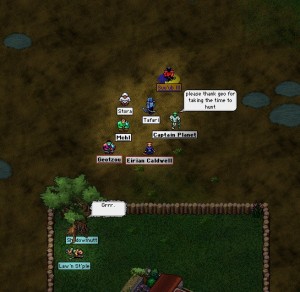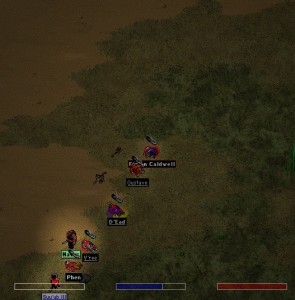I am way behind on posting because in late summer I started a new job and moved myself and the family to a new city. The job is interesting, challenging, and pays well, but it is 9-5ish and I am busy the whole time. Not much time for blogging.
But, now I have more incentive to resume because I’ve been accepted to a conference for next March and need to get my paper written by mid January. 🙂 And I’ve just seen a call for an online conference at which I could make a presentation on the same topic, only multimedia instead of just text. So, yay. 🙂
The conference is Practicing Theory: Imagining, Resisting, Remembering; the annual conference of the Amsterdam School for Cultural Analysis (ASCA).
I submitted the following abstract:
Finding Balance Through Doubled Resistance: Piloting a Collaborative Ethnograpic Approach to Game Studies in the Clan Lord MMO
The tension between theory and practice is long-standing, but in recent years it has been brought into sharper relief by the work of scholars such as Henry Jenkins, who argue for study of popular culture from stance of engagement rather than distance. Jenkins resists the dismissive stance toward popular culture and fan communities that long held sway in academia and coined the term “aca-fan” to describe one working from such a position. He has further argued for the recognition that fans themselves bring a critical eye to pop cultural texts that deserves recognition as having some scholarly value.
Jenkins has recently called for the development of “another set of critical practices which reflected different emotional and social relations to popular culture” than those of the scholar looking from a distance or an aca-fan looking only from inside. This brings us back to the question of resistance. A scholar who is also a fan may try to study the cultural product of which she is a fan, resisting on the one hand theorizing from a distance, and on the other a perhaps over-enthusiastic engagement. Is an uneasy balance between the two the best we can hope for? Or can these stances be in some way integrated into a more productive whole?
This case-study aims for just such a synthesis, using the community around a smaller Multi-Massive Online Game (MMO) in which the author participates to pilot a collaborative ethnographic approach. While the author takes a traditional ethnographic approach, members of the MMO’s community are invited to add their voices, as are game theorists who stand entirely outside the MMO. The resulting poly-vocal work offers a possible model from which to develop a more balanced and integrated approach to pop cultural products and fan communities.
The MMO in question is Clan Lord, and so now I need to figure out the best way of inviting involvement of other players, GMs, etc.

